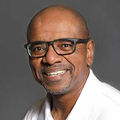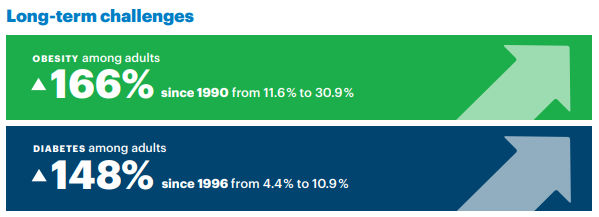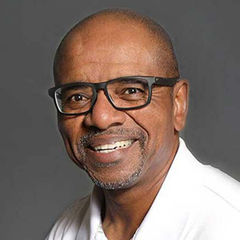The following article appeared in op-ed section of Morning Consult.
Last month, America’s Health Rankings released its 2019 annual report, which each year assesses the nation’s health on a state-by-state basis. This year’s report looked at successes and challenges from the past 30 years and found some interesting data points, most notably that the obesity rate has skyrocketed 166 percent and the diabetes rate 148 percent.
SOURCE: America's Health Rankings' Annual Report, 2019
America’s healthcare costs continue to increase with nothing resembling proportionate improvement in health outcomes. The prevalence of chronic, inactivity-related diseases is on the rise. According to the Centers for Disease Control and Prevention, approximately one in two people in the U.S. has at least one chronic health condition—such as heart disease, cancer, hypertension, diabetes or obesity—and one in four adults has two or more chronic health conditions.
The sad reality is that only one in four adults globally is considered sufficiently physically active, with physical inactivity identified as the fourth leading cause of death worldwide (World Health Organization, 2017). In America, less than 15 percent of U.S. adults meet both aerobic-activity and muscle-strengthening guidelines, as defined in the Physical Activity Guidelines for Americans.
Doctors and other health care professionals for years have told us that even just a little bit of physical activity will help ward off disease. It is long proven that physical activity is an effective component of a treatment plan for many of the health conditions listed above, as well as other preventable diseases.
Yet, we don’t heed that advice. Why?
There are some default, easy answers: Exercise is too hard. We don’t have time between work and family care. It’s simply not fun.
The truth is, of course, much more complicated, as sustaining physical activity at recommended levels requires significant change to one’s lifestyle. More times than not, adults don’t make lifestyle changes unless, in a way, it’s their idea—no matter how many experts tell them to.
Thankfully, in the world of preventing, managing and treating costly chronic illness, there is a relatively new arrow in the quiver: health and wellness coaching.
The well-qualified health coach is an expert in using techniques like active listening and motivational interviewing, which have been proven far more effective than dispensing advice or simply directing people to do something.
Health coaches also know enough of the basics of lifestyle medicine to work adjacent to, or within, the healthcare setting, supporting teams of doctors and other care providers. But unlike clinicians, health coaches don’t rely on dispensing expertise. Instead, they gently and strategically empower the individual to trust his or her life experiences, which so often holds valuable lessons, on the path to lasting healthy change. They equip individuals to chart their own courses to fending off lifestyle-related disease.
Unfortunately, health coaching remains a fledgling field. What is needed from preventive care is to consider and embrace it. Imagine health systems running pilot projects in which a qualified, credentialed health coach is plugged into care teams on an interim basis to test for improved patient outcomes and better patient experiences. That would require a level of surveillance of patient outcomes beyond clinic walls, and the development and implementation of such a program is a goal worth pursuing as we work to improve people’s overall levels of health and wellness.
Clinicians could also identify trusted health-coaching resources in their communities and refer on a trial basis. Qualified, credentialed health coaches can now be found in hospital wellness centers, accountable care organizations (ACOs) and even innovative health clubs. The golden opportunity for the medical community, particularly those clinicians who are inclined to the lifestyle-medicine approach, is to test the incorporation of health coaching into their clinical practice—and to share the results of their experiences with their fellow healthcare professionals.




 by
by 




 by
by